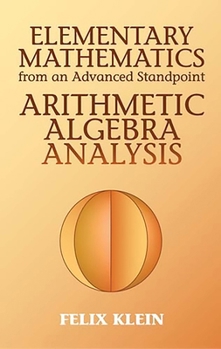Elementary Mathematics from an Advanced Standpoint: Arithmetic, Algebra, Analysis
Select Format
Select Condition 
Book Overview
"Makes the reader feel the inspiration that comes from listening to a great mathematician." -- Bulletin, American Mathematical Society
A distinguished mathematician and educator enlivens abstract discussions of arithmetic, algebra, and analysis by means of graphical and geometrically perceptive methods. His three-part treatment begins with topics associated with arithmetic, including calculating with natural numbers, the first extension...
Format:Paperback
Language:English
ISBN:048643480X
ISBN13:9780486434803
Release Date:July 2004
Publisher:Dover Publications
Length:274 Pages
Weight:0.74 lbs.
Dimensions:0.6" x 5.4" x 8.4"
Customer Reviews
3 ratings
Still the best book for Math education today !
Published by Thriftbooks.com User , 15 years ago
I read Felix Klein's [1849-1925] 3-volume Math book [publised in German, 1924] in Chinese translation bought recently in Beijing bookshop. The chinese translators are themselves mathematicians, so they corrected some translation mistakes made by the 1939 English translators from whom they translate into Chinese. Klein was a great mathematician, being the Father of Modern Geometry based on Group Theory [Erlanger Program]. He was also a great Math educationist, who built the Gottingen University into the World Center of Mathematics before WW II, attracted the Germany's and the World's best mathematicians to teach and learn there. eg. David Hilbert, Noether, Laskar, etc. This 3-volume Math books were compiled by his assistants from the lectures he gave over 20+ years in breaching the gap of Secondary School Elementary Math and University Modern Math, hence the title "Elementary Math from an advanced standpoint". Although written 80 years ago, his concerns and teachning are still valid today. Except for France where they teach modern math concepts in Lycee (secondary school from 3eme to Terminale), other countries' secondary schools don't introduce these modern concepts (Group, Ring, Field...), some with little Set theory at best. For Singapore and the English commonwealth countries, seconday and high school math are still using the same syllabus 100 years ago: 100% computational-bias (calculus, trigo, classical algebra). Klein spotted this gap 80 years ago, as indicated in the volume 1, which he labelled as Syllabus A, Syllabus B and Syllabus C. In Syllabus A (which is still used worldwide): all math subjects (algebra, geometry, trigo...) are taught as separate independent modules. The secondary school students don't see them as inter-connected. In Syllabus B, Klein proposed to base whole math teaching on Functions, which is intuitive as functions can be visualised in Graphs, and link to all branches of math. eg. Function exponential e: e^x = 1 + x + 1/2! x^2 + 1/3! x^3 +.... also e^ix = Cos x +i.Sin x where the function exponential has linkage to trigo (cosine and sine), and algebra's complex number i. Same can be applied to calculus: integration and differentiation link to functions like Log, exponential, trigo, etc. Although he didn't elaborate on Syllabus C (out of his life / book context), but I would presume he had predicted the Bourbaki school of Math based on Set Theory as math structures. This approach of teaching was very prominent in French Mathematics Education. It has proved with little success to students because of being too abstract, distancing the Math from real-life (pure math vs applied math). Klein, although a pure math par excellence, didn't encourage this approach which was advocated after his death by the French Bourbaki mathematicians. I admire Klein's foresight in Syllabus B intuitive pedagogy which will introduce secondary school students gradually to the University modern math concepts. After 80 years, his dre
Elementary Math Analysis
Published by Thriftbooks.com User , 18 years ago
This book was just what I was looking for. Simple to understand, something to bring me up to speed on some long forgotten math.
Still a great resource
Published by Thriftbooks.com User , 19 years ago
About the set: Klein's Elementarmathematik lectures was intended as a survey of mathematics for those who already knew most of the technical detail, especially future teachers, but who perhaps lacked a good understanding of mathematics as a whole. The lack of a broad perspective is probably at least as big a problem today as it was then, so Klein's text is still valuable. Klein also frequently discusses historical and pedagogical aspects, and the tone is quite informal throughout. About this volume: The first part discusses basic arithmetic, with great emphasis on how it should be taught. Being such an enthusiastic lecturer, Klein cannot resist also including little sections on things like Fermat's last theorem and quaternions. The second part suddenly becomes much more sophisticated, as Klein sketches a rather non-standard approach to understanding algebraic equations, in particular incorporating a bit of Klein's trademarke icosahedron material. To keep up with this presentation one should probably consult his icosahedron book as well. For the third part, on analysis, we are back on familiar ground again, which makes it easier to appreciate this masterful overview, covering many of the great ideas of analysis and putting them in context with interesting discussions that are often partly historical.





